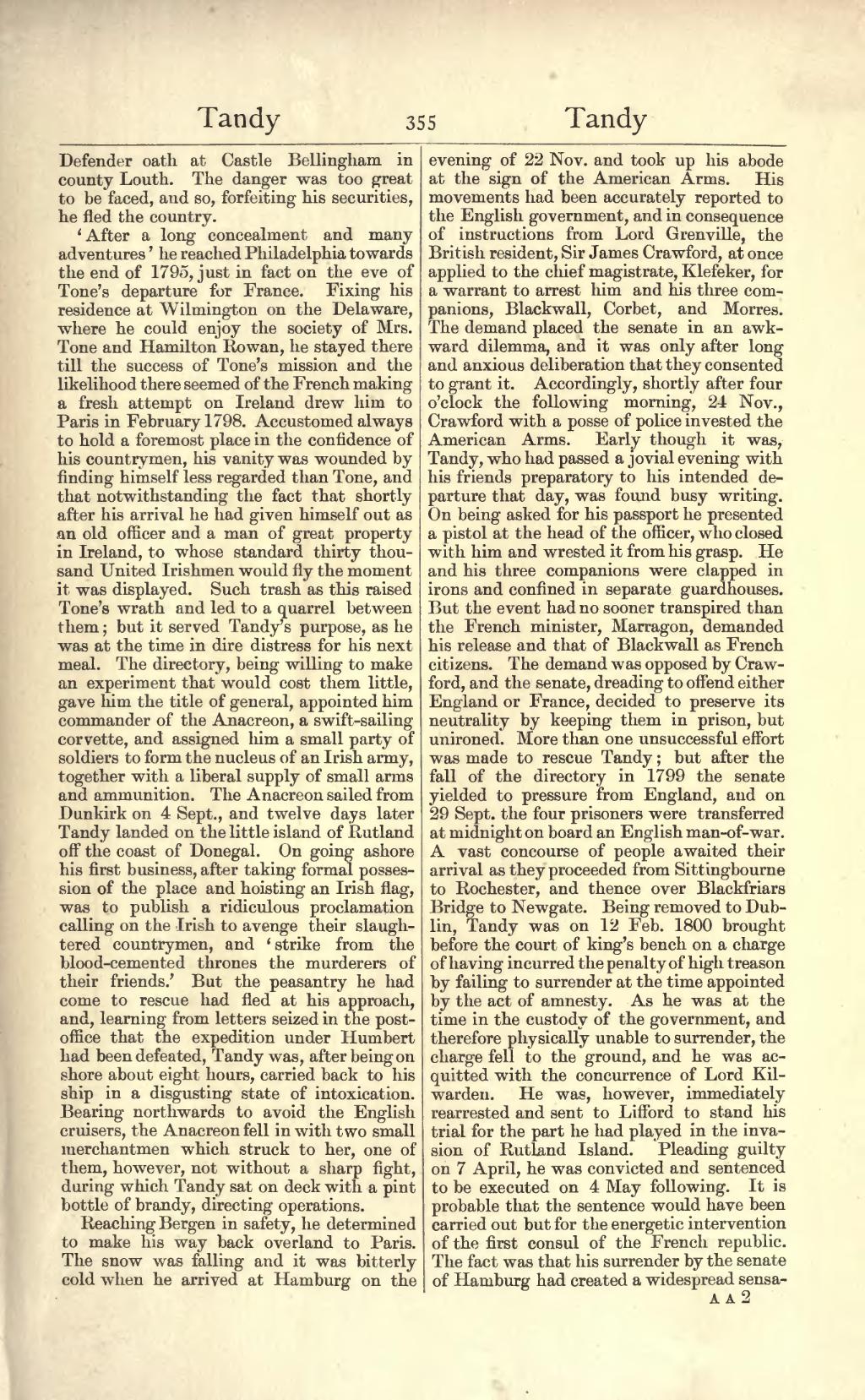Defender oath at Castle Bellingham in county Louth. The danger was too great to be faced, and so, forfeiting his securities, he fled the country.
‘After a long concealment and many adventures’ he reached Philadelphia towards the end of 1795, just in fact on the eve of Tone's departure for France. Fixing his residence at Wilmington on the Delaware, where he could enjoy the society of Mrs. Tone and Hamilton Rowan, he stayed there till the success of Tone's mission and the likelihood there seemed of the French making a fresh attempt on Ireland drew him to Paris in February 1798. Accustomed always to hold a foremost place in the confidence of his countrymen, his vanity was wounded by finding himself less regarded than Tone, and that notwithstanding the fact that shortly after his arrival he had given himself out as an old officer and a man of great property in Ireland, to whose standard thirty thousand United Irishmen would fly the moment it was displayed. Such trash as this raised Tone's wrath and led to a quarrel between them; but it served Tandy's purpose, as he was at the time in dire distress for his next meal. The directory, being willing to make an experiment that would cost them little, gave him the title of general, appointed him commander of the Anacreon, a swift-sailing corvette, and assigned him a small party of soldiers to form the nucleus of an Irish army, together with a liberal supply of small arms and ammunition. The Anacreon sailed from Dunkirk on 4 Sept., and twelve days later Tandy landed on the little island of Rutland off the coast of Donegal. On going ashore his first business, after taking formal possession of the place and hoisting an Irish flag, was to publish a ridiculous proclamation calling on the Irish to avenge their slaughtered countrymen, and ‘strike from the blood-cemented thrones the murderers of their friends.’ But the peasantry he had come to rescue had fled at his approach, and, learning from letters seized in the post-office that the expedition under Humbert had been defeated, Tandy was, after being on shore about eight hours, carried back to his ship in a disgusting state of intoxication. Bearing northwards to avoid the English cruisers, the Anacreon fell in with two small merchantmen which struck to her, one of them, however, not without a sharp fight, during which Tandy sat on deck with a pint bottle of brandy, directing operations.
Reaching Bergen in safety, he determined to make his way back overland to Paris. The snow was falling and it was bitterly cold when he arrived at Hamburg on the evening of 22 Nov. and took up his abode at the sign of the American Arms. His movements had been accurately reported to the English government, and in consequence of instructions from Lord Grenville, the British resident, Sir James Crawford, at once applied to the chief magistrate, Klefeker, for a warrant to arrest him and his three companions, Blackwall, Corbet, and Morres. The demand placed the senate in an awkward dilemma, and it was only after long and anxious deliberation that they consented to grant it. Accordingly, shortly after four o'clock the following morning, 24 Nov., Crawford with a posse of police invested the American Arms. Early though it was, Tandy, who had passed a jovial evening with his friends preparatory to his intended departure that day, was found busy writing. On being asked for his passport he presented a pistol at the head of the officer, who closed with him and wrested it from his grasp. He and his three companions were clapped in irons and confined in separate guardhouses. But the event had no sooner transpired than the French minister, Marragon, demanded his release and that of Blackwall as French citizens. The demand was opposed by Crawford, and the senate, dreading to offend either England or France, decided to preserve its neutrality by keeping them in prison, but unironed. More than one unsuccessful effort was made to rescue Tandy; but after the fall of the directory in 1799 the senate yielded to pressure from England, and on 29 Sept. the four prisoners were transferred at midnight on board an English man-of-war. A vast concourse of people awaited their arrival as they proceeded from Sittingbourne to Rochester, and thence over Blackfriars Bridge to Newgate. Being removed to Dublin, Tandy was on 12 Feb. 1800 brought before the court of king's bench on a charge of having incurred the penalty of high treason by failing to surrender at the time appointed by the act of amnesty. As he was at the time in the custody of the government, and therefore physically unable to surrender, the charge fell to the ground, and he was acquitted with the concurrence of Lord Kilwarden. He was, however, immediately rearrested and sent to Lifford to stand his trial for the part he had played in the invasion of Rutland Island. Pleading guilty on 7 April, he was convicted and sentenced to be executed on 4 May following. It is probable that the sentence would have been carried out but for the energetic intervention of the first consul of the French republic. The fact was that his surrender by the senate of Hamburg had created a widespread sensa-
